 Katamino Tower—a solo puzzle game by Marko Pavlović, published by Gigamic—is, without a doubt, and by far, the game I have found the most difficult to put away. Not so much because it was so fun that I could not stop playing, but rather because it is literally impossible to fit back into the box it comes with unless you solve one of the final puzzles.
Katamino Tower—a solo puzzle game by Marko Pavlović, published by Gigamic—is, without a doubt, and by far, the game I have found the most difficult to put away. Not so much because it was so fun that I could not stop playing, but rather because it is literally impossible to fit back into the box it comes with unless you solve one of the final puzzles.
This is problematic, in that Katamino Tower’s strength is in offering a series of increasingly difficult 15-minute-or-so brain-burning puzzles, which would be perfect for a one-shot session between work projects, or while waiting for family to be ready to go out for lunch, etc. But because it can’t really get put away (unless you get a separate shoe box to store the pieces in), it makes it hard to think of it as a filler game. Nevertheless, if you surmount this logistical conundrum, and if you like to feel really dumb for 15 minutes and then overly proud of yourself for the rest of the day once you solve a puzzle, you might really, really dig Katamino Tower.
Gameplay Overview:
Katamino Tower is simple in concept. The game comes in square box in which there is a cylindric cardboard tube, in which there is a natural wood-stained base with a dowel on which colored wooden pieces have been assembled to form a tower of 5 units in height. It looks fairly reminiscent of the Fisher Price baby toy we always called the Donut Tower, although the Katamino version is cylindric rather than pyramidic in shape. The game also includes a small rulebook and some rather cryptic cards.
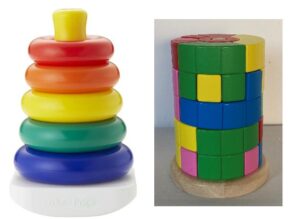
Once you remove the cardboard tube and take the colored pieces off of the dowel, the cards start to make sense. They present a series of challenges, from (supposedly) easy to (in fact) very difficult.
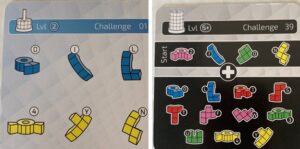
In addition to identifying the puzzle by its difficulty (which is essentially the height of the tower you are being asked to build), the card also tells you which of the colored pieces to use. You then use these pieces to make a tower of the puzzle’s assigned height. If you have that many rows of the tower filled in without any gaps, and no puzzle pieces extending beyond the assigned height, you win, and your reward is to move on to the next puzzle card, which is slightly more difficult, or to jump ahead to the next tier of puzzles, which adds another tower level, which is substantially more difficult.
Each successfully solved puzzle is a win, sort of. You can stop whenever you want and return to the game later, but ultimately, you only truly win Katamino puzzle if you can solve the final challenge puzzle, which, as alluded to earlier, is to reassemble the entire tower and therefore put the game back into its original box. Failing that, the game cannot be put away in its original packaging and will stare at you with puppy dog eyes (even from within its closed shoe box), asking you to give it one more try.

Game Experience:
Oy, this game is satisfyingly frustrating. The early levels of difficulty, with the goal of making a tower two layers in height, took me between 5 and 20 minutes to solve and I got a nice serotonin hit upon solving each one. How it works is you take a card from the stack corresponding to the level you’ve chosen, identify the pieces the puzzle wants you to use, and go at it.
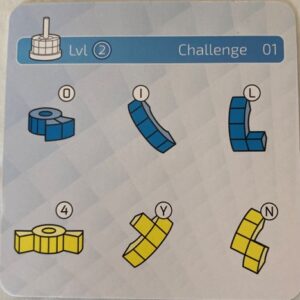
Remember that “easiest puzzle” photo up above? You know, this one?
So I grabbed the six pieces indicated and the tower base and got to work. Around 20 minutes later, and with a great deal of “WTF” style utterances (which, coincidentally, allowed me to really lean into some of my Italian lessons—those are some great swear words), I managed to produce this.
From this point on in the review, there will be some mild spoilers, but I do not think it will spoil your fun, if this is the sort of game you enjoy. But you’ve been warned!
I worked my way through a few more basic, two-level towers, and I did get a little faster at them, and then, a day or two later, I felt ready to tackle a three-level tower.
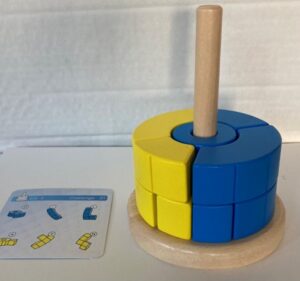
Wowzers, it was so much harder. I did finally solve my first one after an hour, but rather than feeling a glow of mental superiority, I swore at the game like I had just beaten it in a fistfight and it was lying at my feet, and tossed the game into its adopted home, the shoe box.
A few days later I got it out again, tried another 3-level towel, solved it after about an hour, and decided, you know what, this isn’t for me, really. It was a brain burn, but not my kind of burn.
Dear reader, you might think at this point, I would have boxed up my copy of Katamino Tower and typed up my review, but at Board Game Quest, we are not content until we know with certainty that our reviews will give you the full picture of the game. For one thing, it’s impossible to box up until you solve the final puzzle (or cheat and read the solution). Plus, I am a little bit sadistic, so I decided to inflict the game on two other poor, unsuspecting puzzle people, one of whom is my wife, who declared it unsolvable, and one of whom (let’s call her “Amy”) is a math teacher who always wins games. Amy (who said I could use her photo) solved a level-two puzzle in about 30 minutes and then demanded a chance to redeem what she saw as an unsuccessful first effort by jumping right to the hardest level. I warned her it would be too big of a jump but she was having none of it.
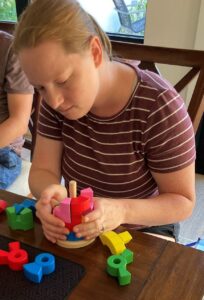
Suffice it to say after about an hour, the unassembled Katamino Tower pieces were tossed back into the shoe box and Amy left our house frustrated. But maybe frustrated in a good way? We’ll see if she ever comes back. In the meantime, I did flip over the Challenge 40 card to the spoiler side (photo omitted) and reassembled the tower for packaging back into the original box. (What’s crazy is there are actually multiple ways to complete a five-level tower depending on how you start, so even if you do get it back into the box, there is still more adventure for you if you’re that kind of puzzle masochist.)
Final Thoughts:
Do you see that look of determination on Amy’s face? She would have stayed all night until she solved the puzzle if her husband and child had not needed to go home. If you are the kind of person who lives for solving puzzles, the unsolved, unboxed Katamino Tower sitting out in the open or in an ad hoc container on your shelf will gnaw at you, compelling you to try again to truly win. I admit I felt this for a day or so, but I am more of a puzzle dilettante, so eventually I flipped over the final card, deciphered the code showing the solution, and put the game away. But if you are like Amy, then this is a game for you.
With that said, this game is only for the most dedicated of puzzle solvers and really only for those who consider spatial relations to be a strength. For the rest of us, it might be more fun to inflict on that guy or gal who always knows the answer to everything and drive them crazy for a few hours. While we don’t do ratings for family games, I don’t think I would rate it any higher than 3 for the mainstream audience, but if you are in the niche at which this puzzle game is targeted, it is a 5-plus. Boy howdy, it is challenging, and so if you love to be challenged, you definitely need to buy a Katamino Tower (and a pair of shoes) and work your way through its devilish difficulty.





















